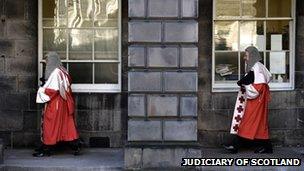Kenny MacAskill defends legal aid change
- Published

Kenny MacAskill said the changes would not compromise the right to a fair trial
Proposed cuts to Scotland's legal aid bill will not breach the right to a fair trial, the justice secretary said.
Lawyers have voted to strike over plans to force the accused in criminal cases to contribute to legal aid if they have a weekly disposable income above £68.
Critics claim it may force people to plead guilty or represent themselves because they cannot afford to pay.
But Kenny MacAskill said there was no evidence the policy compromised justice in areas where it was already in place.
Scotland's criminal legal aid bill was £98m last year and the Scottish government believes its changes would cut it by £3.9m.
When Mr MacAskill introduced plans to increase the proportion of people making a financial contribution to their legal aid, and also asking lawyers to begin collecting the money from clients, the law profession threatened to strike.
On Wednesday, the minister met members of the Law Society of Scotland in an effort to resolve the dispute.
He discussed increasing the threshold at which the accused would have to pay and suggested that the Scottish Legal Aid Board could instead collect the cash and charge solicitors for carrying out the work.
But the proposals failed to solve the impasse between the two sides.
On the BBC's Sunday Politics Scotland, Mr MacAskill said every piece of legislation passed in Scotland had to comply with the European Convention on Human Rights (ECHR), which enshrines the right to a fair trial.
He said: "I don't believe it (the policy) will breach fair trial obligations. Every Act in the Scottish Parliament has got to be ECHR-proof.
"All the evidence from south of the border and other jurisdictions is that a contribution - which is the norm elsewhere - does not result in more people being unrepresented.
"Let's be clear; 82% of people who apply and get criminal legal aid will not have top make a contribution. Thereafter the contributions can be relatively minor.
"That way, we protect the integrity of the system and there's no evidence, from similar systems that operate, either south of the border or elsewhere, that justice is interfered with."
Mr MacAskill, who himself used to be a solicitor, said it was only right that some people who are accused in criminal cases contributed financially when some victims also have to pay for things like protective orders.
He said: "Parliament has quite rightly decided that there is something manifestly wrong in our society that the alleged perpetrator should not have to pay, but the alleged victim should contribute."
But he insisted that even if the threshold at which people have to pay is increased, as the Law Society had called for, money would have to come out the legal aid budget elsewhere.
"I'm prepared to increase that threshold and enter into discussions with the Law Society," he said.
"But I don't have any more money, it would have to be taken out of the legal aid budget and there would have to be other cuts, probably upon legal aid fees."
- Published8 November 2012
- Published7 November 2012